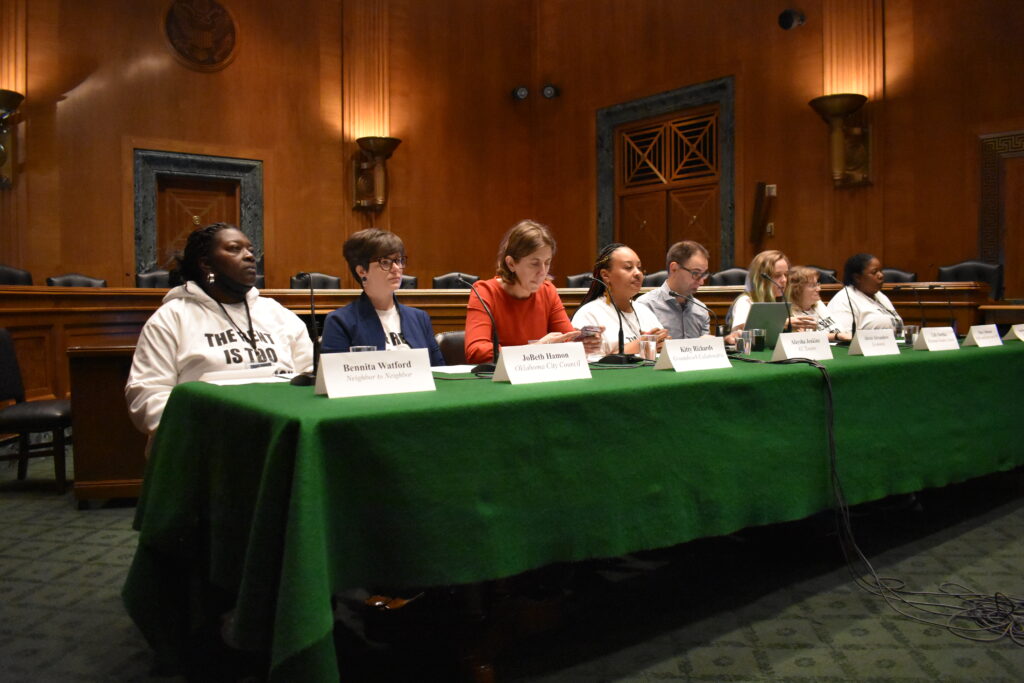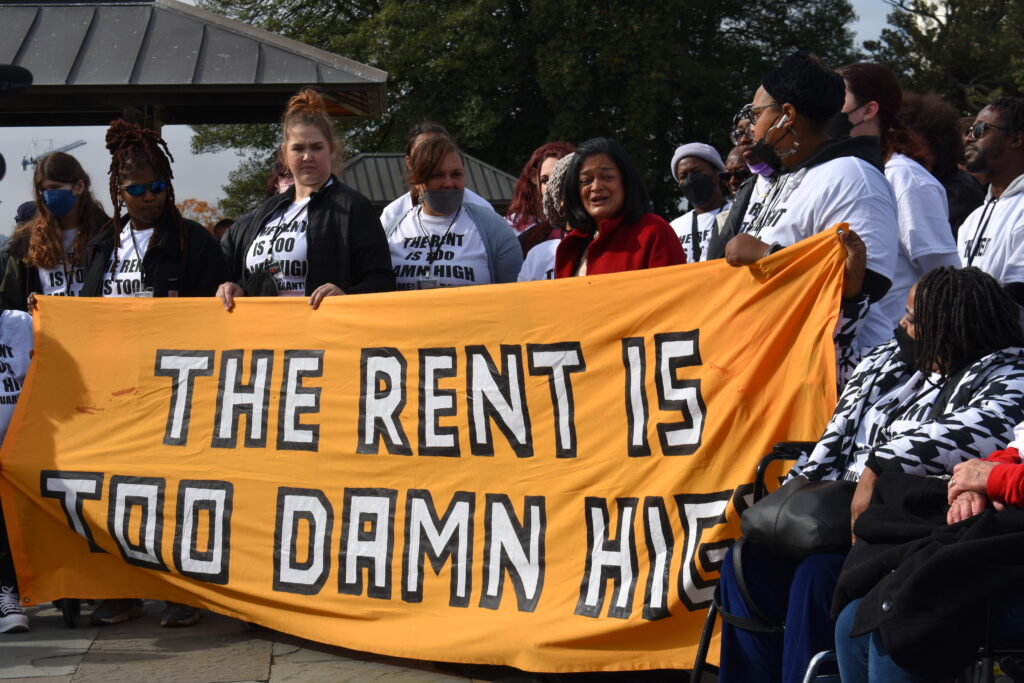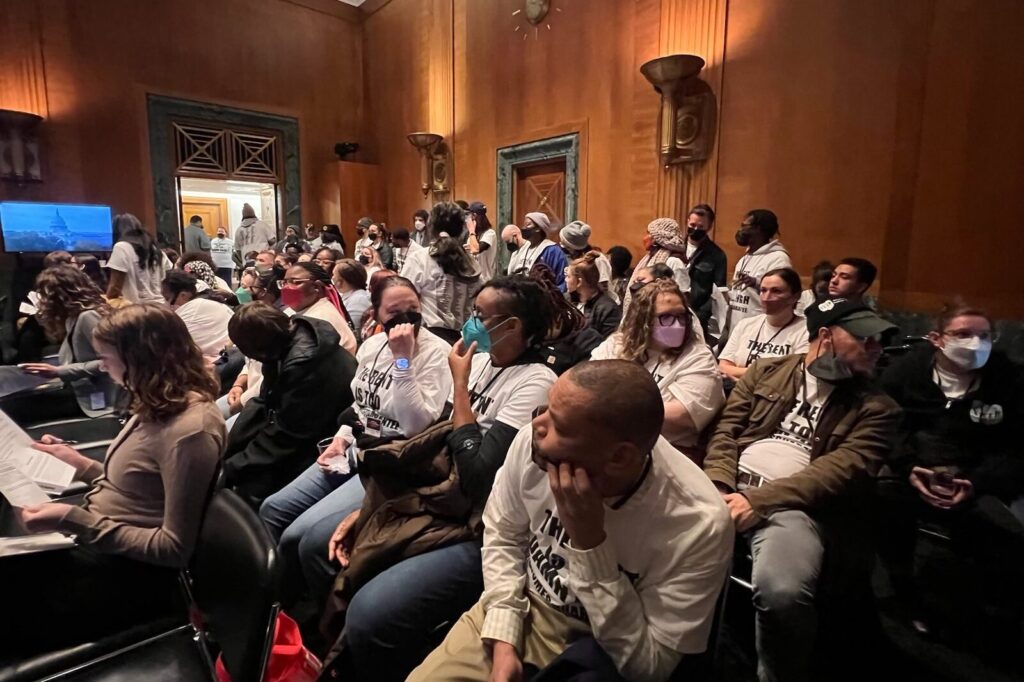


On November 15 – 16, Local Progress joined Homes Guarantee’s Tenant Takeover where 100 tenants visited Washington, DC to urge the federal government to take action against the housing crisis by requiring key tenant protections for enterprise-backed multifamily properties.
During Wednesday’s congressional briefing on Housing Supply and Federal Tenant Protections, tenant leaders, economists, and Local Progress Housing Steering Committee Member and Oklahoma City Councilmember JoBeth Hamon shared their experiences trying to find a home in a world where corporate landlords are ratcheting up the rent and neglecting their properties.
“In the past 4 years, my building has been purchased twice by a corporate landlord with mortgages backed by Fannie Mae. With the previous owner, the maintenance of the building immediately went downhill, elevators didn’t work for months on end, rent was being hiked, and many of my neighbors decided to move away rather than live in such conditions… In my capacity as an elected official, I am doing what I can to respond to this crisis - and want to be able to do more, like pass tenant protections, rent stabilization, good cause eviction protections, and protection from discrimination. But the state of Oklahoma prevents me from doing so due to abusive preemption. We need the federal government to take action.”
JoBeth Hamon, Oklahoma City Councilmember and Local Progress Housing Steering Committee Member
“I’ve been searching for a new apartment for over a year and a half but the rent is too damn high. I live on a fixed income. My entire check goes to the rent. There’s nothing left to pay for lights, toiletries, and groceries. My credit cards are STILL maxed out. Every month my rent is STILL short. I can't afford to stay but I can’t afford to leave. It feels like the world is telling me that I’m not worthy of living”
Bennita Watford, Neighbor to Neighbor, Missouri
COVID-era rental protections are expiring, but rents continue to skyrocket. Affordable housing is becoming more and more out of reach for working families, predominantly affecting lower income communities and communities of color. The White House has even taken notice as they develop a blueprint for a Renters Bill of Rights: “In 2019, almost one quarter of the 44 million renter households spent at least half their earnings on rent.iv In the last three years, rental affordability has worsened, with rents rising nearly 26 percent nationally during the pandemic.” People are facing eviction or constant threat of eviction forcing residents to choose between rent and other basic necessities like food and groceries.
“Landlords have more power and leverage in a market with a shortage of available rental housing. Under these conditions, tenants have few if any options. This means landlords can hike rents on current tenants and charge exorbitant rents for new tenants. Tenants are trapped and easily exploitable.
Mary Osborne, Rights and Democracy, New Hampshire
As more families continue to face housing instability, Local Progress members across the country have been mobilizing to pass bold policy at the local level to keep people in their homes and advocate for better state and federal tenant protections. In January, the Biden Administration released the Blueprint for a Renters Bill of Rights, which set forth principles for developing policies to protect tenants. In May, the Federal Housing Finance Agency requested public input on tenant issues in multifamily enterprise-backed properties and potential impact of requiring tenant protections. In July, 74 local elected officials signed on to the LP Housing Steering Committee’s public comment to the Federal Housing Finance Agency in favor of Homes Guarantee’s demands for federally financed properties.
Following the briefing, Congresswoman Pramila Jayapal joined the tenants to show her support for their demands and join in their call for federal action to address the urgency of the crisis. On Thursday, Homes Guarantee and Local Progress sat down with members of the Federal Housing Finance Agency to talk about the need to require tenant protections at properties that receive federal funding.
Tenant leaders, local electeds, policy experts, economists, and federal electeds all know: we need tenant protections now.